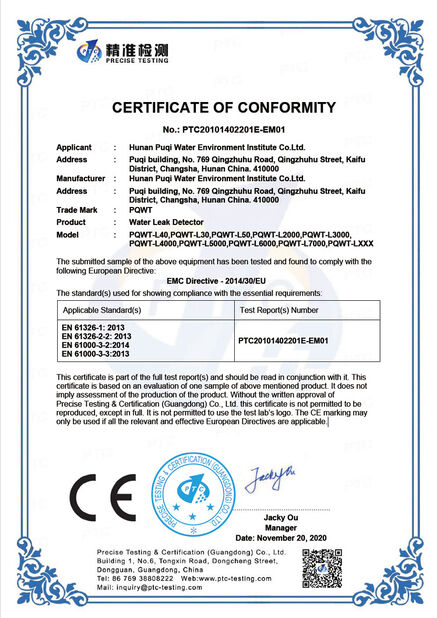A water leak detector is an instrument specifically used to detect and locate leaks in water pipes, water supply systems or other liquid delivery systems. Its importance lies not only in being able to detect and repair water leaks in a timely manner and prevent water waste, but also in being able to protect the structural safety of buildings and avoid water damage. This article will introduce the performance characteristics of the water leak detector in detail for your reference.
Working Principle
The water leak detector works mainly based on the acoustic principle. When water flows out of the cracks or holes in the pipe, it will produce sounds of a specific frequency. These sounds will propagate along the pipe and pass through the soil to the ground. The water leak detector captures these sound signals through highly sensitive sensors and determines the location of the leak through the built-in analysis and processing system.
In addition to the acoustic principle, some advanced water leak detectors also use electromagnetic principles. By sending electromagnetic waves to the underground pipeline and receiving the reflected signals, the condition of the pipeline and the location of the leak can be determined. This method is particularly suitable for pipelines that are buried deeper or have complex surrounding environments. The application of optical principles in water leak detection is relatively rare, but in some special cases, optical detection methods can also play an important role. For example, by injecting fluorescent dyes into the pipeline and using optical equipment to observe the flow of the dyes, the location of the leak can be determined.
Performance characteristics
1. High sensitivity: Water leak detectors usually use highly sensitive sensors that can capture weak sound signals and accurately locate the leak.
2. Multiple display modes: The water leakage detector has multiple display modes such as pointer, cursor, sound, and digital, which makes it easy for users to understand the detection results intuitively. Some high-end instruments are also equipped with full-color touch screens, which are more convenient to operate.
3. Strong anti-interference ability: In complex underground environments, water leakage detectors need to have good anti-interference ability to eliminate interference from other noises and accurately capture water leakage signals.
4. Data processing ability: The water leakage detector has a built-in high-speed and high-precision data processing system, which can quickly analyze and process the captured sound signals to improve detection efficiency and accuracy.
5. Portability: Water leakage detectors are usually small in size and light in weight, easy to carry and use in the field. This enables inspectors to perform rapid detection in various environments.
6. Versatility: In addition to detecting water leakage points, some water leakage detectors also have other functions, such as measuring pipeline pressure and flow, etc., to provide users with more comprehensive pipeline information.
Application Examples
Water leakage detectors are widely used in residential, commercial, municipal and industrial fields. In residential and commercial buildings, inspectors can use leak detectors to quickly locate water pipe leaks in houses, apartments, and commercial facilities, and repair them in time to avoid water damage. In municipal engineering, leak detectors are used to detect and maintain urban water supply systems to prevent large-scale water resource losses. In industrial facilities, leak detectors are used to monitor and maintain high-pressure and high-flow industrial pipeline systems to ensure production safety.
Precautions for use
1. Follow the guidelines: When using a leak detector, you should strictly follow the manufacturer's guidelines to avoid misoperation that may cause damage to the instrument or inaccurate test results.
2. Regular inspection and calibration: To ensure the accuracy of the leak detector, it should be inspected and calibrated regularly. This includes checking the sensitivity of the sensor, the battery power, and the overall performance of the instrument.
3. Pay attention to environmental noise: During the detection process, you should pay attention to eliminating the interference of environmental noise. For example, in a noisy environment, you can use active noise reduction to improve the clarity of listening.
4. Protect the instrument: The leak detector is a precision instrument and should be protected during use. Avoid exposing it to harsh environments, such as high temperature, humidity or strong magnetic fields.
The water leakage detector plays an important role in the field of water leakage detection due to its high sensitivity, multiple display modes, strong anti-interference ability, data processing ability and portability. Through the reasonable use and maintenance of the water leakage detector, we can timely discover and repair water leakage problems, protect property safety and save water resources.

 Your message must be between 20-3,000 characters!
Your message must be between 20-3,000 characters! Please check your E-mail!
Please check your E-mail!  Your message must be between 20-3,000 characters!
Your message must be between 20-3,000 characters! Please check your E-mail!
Please check your E-mail! 

